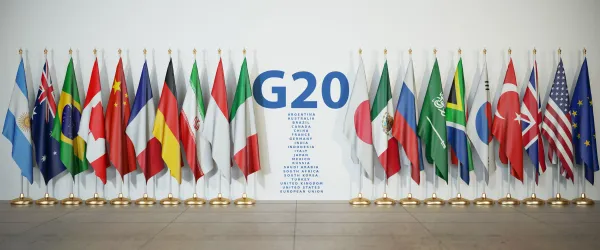
Hungary, Poland hope law reforms will see EU unfreeze billions in funding in 2023
The EU last year attempted to address the erosion of perceived democratic norms of the populist governments of Hungary and Poland, by withholding a combined EUR 138bn in funding from the two states.
After this unprecedented move, 2023 will be the year when the EU decides on whether to make good on its response to erosions of the rule of law and democratic norms in the two countries.
Regarding Poland, the EU has frozen EUR 75bn in cohesion funds for the 2021-27 period, over violations of the EU Charter of Fundamental Rights, and the EUR 35.4bn of grants and loans earmarked for the country via its Covid recovery programme.
As regards Hungary, the European Commission (EC) has suspended well over EUR 30bn worth of funding to the country. Of this, EUR 22bn was from cohesion funding, which aims to promote sustainable development for the poorer members of the bloc, citing its mistreatment of academic institutions, refugees and LGBTQ+ people.
The EU also suspended EUR 6.3bn over corruption concerns, and EUR 5.8bn from Hungary’s Covid recovery fund, demanding judicial reforms.
Poland has for over a year been fined of EUR 1mn a day, for ignoring an EU ruling to dissolve a disciplinary chamber for judges. That sum now totals over EUR 400mn, and Poland has filed a complaint over the fines.
Cash-strapped Hungary needs funding, PiS faces election battle
Poland and Hungary, both dealing with cost-of-living crises, could certainly use the money. Hungary had an inflation rate of 23.1% in November 2022, according to Statistica’s harmonized index of consumer prices (HICP), while Poland’s HICP was 16.1%, both way above the EU average of 11.1%.
Orban dug deep into Hungary’s state coffers in February 2022, two months ahead of a landslide election victory, when pensioners received an extra ‘13th-month’ pension payment and under 25s were exempted from personal income tax.
Additionally, Hungarian soldiers and police officers got salary hikes of 10%, workers on compulsory work schemes received pay hikes to EUR 270 per month, and families with children received rebates for tax paid the previous year.
In May 2022, having secured a landslide election victory, Orban announced windfall taxes on the “surplus profits” of banks, insurance companies, retail chains, energy firms, telcos and airlines in 2022 and 2023.
Meanwhile in Poland, ruling party PiS is set to face an election in the autumn of 2023, and is polling around 10% lower than when it was re-elected in 2019. The national populist party will be keen to maintain welfare spending in election year to see off its main rival, Donald Tusk’s Civic Coalition, which has been closing in on PiS in the polls, gaining over 10% in the last 18 months.
Countries make some steps, EU not yet convinced
Poland and Hungary, both of which joined the EU in 2004, have formed an alliance and used their vetoes in the EU to protect each other against moves to curtail their populist nationalist governance.
Since coming to power in 2015, Poland’s ruling Law & Justice Party PiS has aped much of what Orban has done, by fiddling with the Constitution, encroaching on the independence of the media and judiciary, and passing anti-LGBTQ+ laws.
Thanks to their alliance, one potential sanction averted so far, for example, has been the suspension of their voting rights for violating common values via the Article 7 procedure.
However, after years of inactivity, the EU is taking perceived erosions of the rule of law in the two countries more seriously. In September 2022, MEPs passed a resolution stating that Hungary is no longer a democracy, after a report investigated the 12 areas covered by the highly critical Sargentini Report of 2018 found that Hungarian democracy had regressed even further in the subsequent four years.
Poland, Hungary backtrack on policies
After years of rejecting criticism of its interpretation of the rule of law and allegations of corruption, Hungary last year promised to establish an independent audit office for EU funds and passed new public tendering rules.
For his part, Orban has downplayed EU concerns regarding Hungary, but his government has nevertheless passed anti-corruption legislation and has promised to meet EU demands regarding judicial independence by the end of March.
In Poland, around a third of municipalities declared themselves “ideologically LGBTQ-free zones” in the last three years. They have now revoked these resolutions following threats to suspend aid payments to local governments. Poland’s government has also begun to reverse some elements of its judicial reforms.
PiS split over judicial reforms
Revealing tensions inside Poland’s ruling PiS party on whether and how it should modify its judicial reforms to meet the EU rule-of-law requirements, Polish President Andrzej Duda accused Development Minister Waldemar Buda of providing “untrue” information about the country’s attempts to unblock the frozen European funds.
Buda had been reminded that he had promised in mid-2022 that Poland would begin receiving its unblocked funds by the end of the year, during an interview with Polskie Radio, Notes From Poland reported.
Buda blamed the EU for “playing games” over this issue, but stated that a new judicial reform bill submitted by the ruling party should be enough to unblock the funds and resolve the dispute. He acknowledged that President Duda had expressed doubts about the legislation, which prompted the bill to be temporarily withdrawn for further consultation.
Duda responded by tweeting that “I do not know where Minister Buda gets his information, but this is untrue”. Buda apologised, tweeting: “if the talks are at a different stage than I indicated, I can only offer my deepest apologies.”
Poland’s Europe Minister Szymon Szynkowski vel Sek, who has led negotiations with the EU, also publicly apologised to Duda for not keeping him adequately informed about the proposed legislation.
While Szynkowski vel Sek, Buda, and Prime Minister Mateusz Morawiecki support the new bill, others in the ruling party have been more critical of it.
Justice Minister Zbigniew Ziobro, leader of the eurosceptic junior coalition party United Poland (Solidarna Polska), strongly opposes any compromise with Brussels, which he claims would compromise Poland’s sovereignty.
PiS chairman Kaczynski has said the proposed legislation “could be extremely destructive for the judiciary and the entire state apparatus,” despite it having been submitted by his own party’s MPs.
Hungary hopeful on release of funds by spring
The Orban government has maintained a more united front, however. Hungarian Regional Development Minister Tibor Navracsics, in an interview with Magyar Nemzet at the end of December, said the Hungarian government and the European Commission have a history of disagreement and will continue to do so.
According to Navracsics, Hungary had completed all necessary agreements with the European Commission in order to receive EU funds by the end of the year, including an expected advance payment of EUR 323m.
Navracsics also addressed the “attacks” made against the government during the negotiations and argued that the EC had only raised objections on issues of “political tastes”.
He added that in the coming weeks, consultations with Elisa Ferreira, European Commissioner for Cohesion and Reforms, will be held and if all goes according to plan, a package of related laws will be approved by Parliament at the end of March. If this deadline is met, the release of funds could occur in April or May, Navracsics said.





